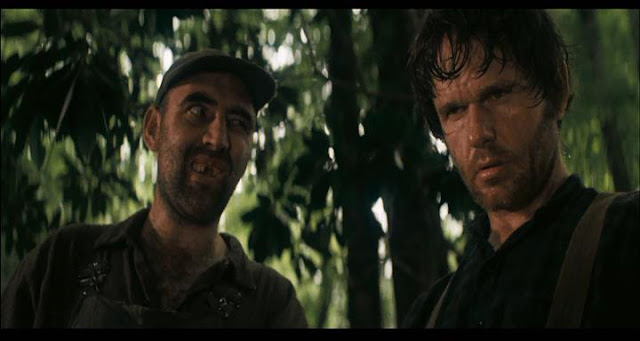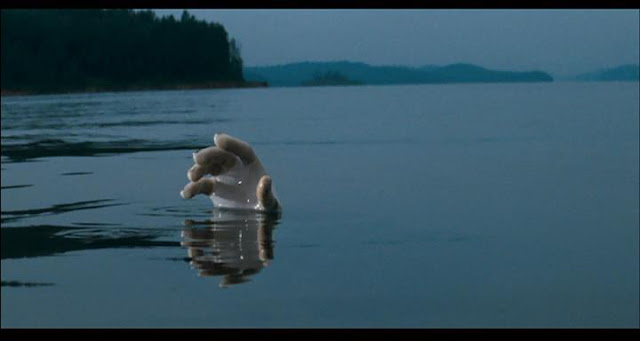The "Deep South" trope, as I'm sure you recall, paints a rather uncultured picture of the southeastern portion of the United States as a largely rural area populated entirely by rednecks, Southern belles, Daisy Dukes, grizzled old moonshiners, fat corrupt sheriffs, Colonel Sanders lookalikes, and people who would string you up if you ever told them the Union won the War Between the States. Everybody's inbred, everybody's illiterate, everybody carries a shotgun, everybody is suspicious of folk who "ain't from 'round here," and everybody who isn't either deeply Christian or secretly a member of the Ku Klux Klan is a psychopath who will carve you up with a chainsaw should you ever cross their path.This whole movie definitely illustrates one unshakable principle: never go to the South for any reason.
-Crow T. Robot
Of course, life doesn't always imitate art, so it would be wrong to assume that people from the South are all actually like this. But every time you watch a movie or a TV show and hear someone end a sentence with "y'all", this is where you usually end up.
Out of all the movies we've done, none of them really do much of anything to set themselves apart from this stereotype. Road House gave us a cavalcade of drunken rednecks in Missouri AND a Larry the Cable Guy clone. Texas Chain Saw Massacre...well, clue's in the title, really. And then of course we have The Giant Spider Invasion, which didn't even take place in the South. And beyond the blog, there's Smokey and the Bandit, The Dukes of Hazzard, and a number of Family Guy episodes among other examples.
And then we come to Deliverance, a 1972 suspense flick that has come to claim the unenviable title of THE ULTIMATE DEEP SOUTH MOVIE.
That was, ironically, based on a book written by someone who was living in Georgia at the time.
Basically, when one thinks of Deliverance, there are one or both of two scenes that pop into people's minds. I'm sure you already know which scenes I'm talking about, and we'll get to them in due time.
First we must establish the plot of the film, in which four city boy friends from Atlanta (played by Burt Reynolds, Jon Voight, Ned Beatty and the bad guy from Robocop and Total Recall) decide to take a seemingly uneventful weekend canoe trip down the fictitious Cahulawassee river valley for one last look at the scenery before a hydroelectric dam is built that will leave the area flooded.
Our first glimpse of hillbilly country is a gas station which looks like a rundown shack with a non-functioning rust-eaten car in front of it. Here we come to the first memorable scene from the film, in which the bad guy from Robocop and Total Recall pulls out a guitar and performs the famous melody "Dueling Banjos" with a banjo-plucking local boy who doesn't see fit to shake his hand afterward.
"I'm not allowed to play with you anymore unless y'all pay for another five minutes."
After hiring two other bumpkins who happen to own a garage to drive their cars out to their finishing point in Aintry to be picked up on Sunday, Burt Reynolds refuses to let them show him where the river is, fixing instead to just drive around aimlessly through the woods since he is quite certain that he knows so well where it is. Eventually they find it, pull their canoes out and go for a little downstream paddlin', passing underneath a bridge where our young banjo-player from earlier watches them. During the ensuing sequence of outdoor activity, Burt Reynolds establishes his character as a stoic outdoorsy type, hailing the life of a rugged nature boy over living as a suburbanite coddled by the conveniences of modern technology and predicting that the machines will one day fail and man will return to the woods in some reverse-Terminator fantasy of his.
Completely ignoring the existence of toilets, lasers and advanced medical science that have helped people live longer lives and make things work more efficiently with less environmental impact. But whatever, if you want to go back to a time where most people lived in huts, never brushed their teeth, and didn't live past their 30s. And I can only assume that one of these modern conveniences you seem to resent so much just happens to be maps.
Meanwhile, your teeth are falling out, you've got lice in your hair, and the lack of bathing begins to show.
The next morning, during another of their canoe trips, John Voight and Ned Beatty get separated from Burt Reynolds and the bad guy from Robocop and Total Recall and end up down a different part of the river, where they make a pit stop and come across two other friendly-looking locals. Who proceed to walk them further into the woods at gunpoint, tie Jon Voight to a tree, and force Ned Beatty to strip naked and...
Well, right about now you may have guessed that we've reached the other most memorable scene in the film. The infamous "squeal like a pig" scene. This is a PG-13 review of an R-rated movie, and I'm not especially comfortable describing a rape scene with the writing style I employ, so I'll just drop a hopefully somewhat tasteful picture with a humorous caption here and leave the rest up to your vivid imaginations.
"Now y'all are in a largely con-servative state, and this kinda thing is usually frowned on 'round these parts, but when y'all been livin' in these here woods fer as long as we have with very little contact with tha outside world, and mos' wimmin findja repulsive anyways...well, ya kinda stop carin' whur ya git it from next."
Thankfully before Jon Voight suffers a similar fate, Burt Reynolds shows up and pierces one of them with his bow and arrow, promptly chasing the other off.
The foursome then spend the next few minutes of the film debating the legality of their situation--whether a jury of the man's relatives (his mother, his aunt, or providing they're not one and the same, his father and uncle) would see such an act as justifiable homicide and considering that the imminent and suddenly convenient damming of the valley will get rid of the evidence - before finally deciding to give the corpse a proper burial. Then, realizing that the mountain people are easily startled but will soon be back and in greater numbers, they decide to get in their canoes and amscray.
Besides, are these the faces of an impartial jury?
During this hasty retreat, the bad guy from Robocop and Total Recall forgets to put on his life jacket and for some reason falls out of the boat into the river (later assumed to have been shot, perhaps by one of the deceased's vengeful toothless companion - suffice to say, he is not seen for most of the remainder of the film) as the boys encounter some rapids that tear one of their canoes to pieces and drops them in a basin, while Burt Reynolds breaks his leg, and about now should be considering recanting his anti-technology speech.
You know, lakes are underrated, really. They're pretty to look at, no noisy raging currents, you can swim in them, they're perfect for water-skiing...
No shattered coccyx.
Believing the other inbred toothless hick to be lurking around nearby just biding his time, and since Burt Reynolds can't be moved, novice sportsman Jon Voight is picked to avenge the death of the bad guy from Robocop and Total Recall. Climbing to the top of a rock face with Burt Reynolds' bow and arrow and staying there until daybreak, Jon Voight finds someone with a rifle looking down into the gorge and, not sure if this is the same guy who ran away from them, but probably believing all these unwashed, uncivilized rednecks to look and smell alike anyway, Jon Voight somehow manages to off the poor bastard with a clumsily-fired arrow through the chest. And only afterward does he realize that it may or may not be that guy. After coming back down the cliff with their fresh kill, they tie up the body with rocks and let him sink to the bottom of the river, as they do the mangled corpse of the bad guy from Robocop and Total Recall after finding him washed up on a nearby rapid.
In Aintry, Burt Reynolds is sent to a hospital while Jon Voight and Ned Beatty are left to work out a plausible story to cover up a potential double homicide charge and explain the fact that one of their party is missing. (To make matters worse, the deputy's brother-in-law is reportedly missing.) The sheriff, being one of those fat beady-eyed authority figures who's probably the Boss Hogg bribing type, is skeptical of their story, but since they have no evidence to hold them on, simply tells them to "go back where y'all came from." And thus the survivors of this canoe trip from hell will take these memories to their graves, secure in the knowledge whatever evidence remains will soon reside at the bottom of a dammed-up lake and Jon Voight relives the trauma in his nightmares for the rest of his life.
Someday you'll look back on this and laugh.
As a suspense story, Deliverance does its job well. A group of city slickers who come out to the country for a peaceful retreat and find themselves out of their element when things take a wrong turn, whereas Burt Reynolds, who earlier in the film comments that technology will fail, the system will break down and man will revert back to his primal stage, suddenly given a taste of the world without creature comforts and finding himself coming out the worse for wear. The scenery is very beautiful and the setting is quite picturesque, but within these thick forests hide the gunmen and rapists. Also, certain parts of the film are left deliberately vague. What really killed the bad guy from Robocop and Total Recall? Was that really the other mountain man Jon Voight arrow'd at the top of the cliff? What DID happen to that one giy's brother-in-law? You don't know. And the movie's certainly not going to tell you. To be perfectly honest, I don't think the movie knows either.
It's just a shame that the main thing that this movie is remembered for is casting a stereotypical light on the population of the Southern states and the Appalachian mountains, who already live in one of the poorest regions of the continental United States with about a third of its residents living below the poverty line, a high unemployment rate, low per capita income and little job availability, where education and living wages lag behind the rest of the country, and where you have a history of economic inequality, lack of infrastructure and political disillusionment.
And to think, the people the author based the original book on were actually quite nice.
Jimmy?








